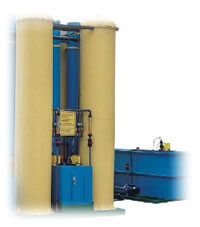Green Cleaning: Recycling Waste Water
The Power Washers of North America is a professional association that assists companies is adopting Best Management Practices (BMP) for recycling waste water. Using this approach, a business can position itself as a premium service provider of environmentally sound policies. That means more revenue, but it could also increase the opportunity to obtain jobs in drought stricken communities. The organization also offers inexpensive certifications as a water reclamation specialist.
As the earth's most precious resource, water is as essential to life as it is to the pressure washing industry. Two machine styles facilitate the recycling waste water. The first is a system that collects and holds the water for dumping elsewhere. The other type also filters the water and either holds it for reuse or enables it to be dumped in accordance with EPA guidelines.

In agricultural areas, the grey water resulting from washing residences is usually fine if it is rinsed into a vegetative area with underlying soil. Regulations can differ among states, so it is best to ensure compliance before recycling waste water in this manner. If a business determines that it should purchase wash water recycling systems, look for products that are compatible with existing equipment and simple to operate.
Other considerations are that sump pumps will not remove all standing water. Vacuum pumps work the best, but the GPM rating must match the pressure washer. All equipment used for recycling waste water needs to be kept separate from the rest. Residual amounts of pollutants cling to hoses and tubing and can be accidentally discharged into other areas. Caution should be used when transporting flammable substances mixed with water because it is still combustible.
The operating surface also matters. Cracks and crevices in the concrete can affect the performance of some products. In this situation, mats usually work well. For sloping areas, a dike may be needed to prevent pooling. If there is a risk of the water running into the storm drain it may need to be blocked. These solutions are both affordable and anyone can learn to use them. Recycling waste water is an environmentally sound and cost-effective practice. Investing time and resources into learning more about this topic is well worth the effort. Any costs can be recuperated through increased charges, as consumers are aware of the importance of offering this beneficial service.
The publisher of these pages is in no way responsible for any damage caused to you, your pressure washer, anyone else, your property, or anyone else's property by trying to implement or by successfully implementing the above-mentioned performance and services.
Read Related Articles:
- Wastewater Disposal; an Important Business Factor to Consider
Comply with EPA and eliminate waste water.
- Water Recovery Systems
Extract the contaminated water and transfer it to the recycling system.


